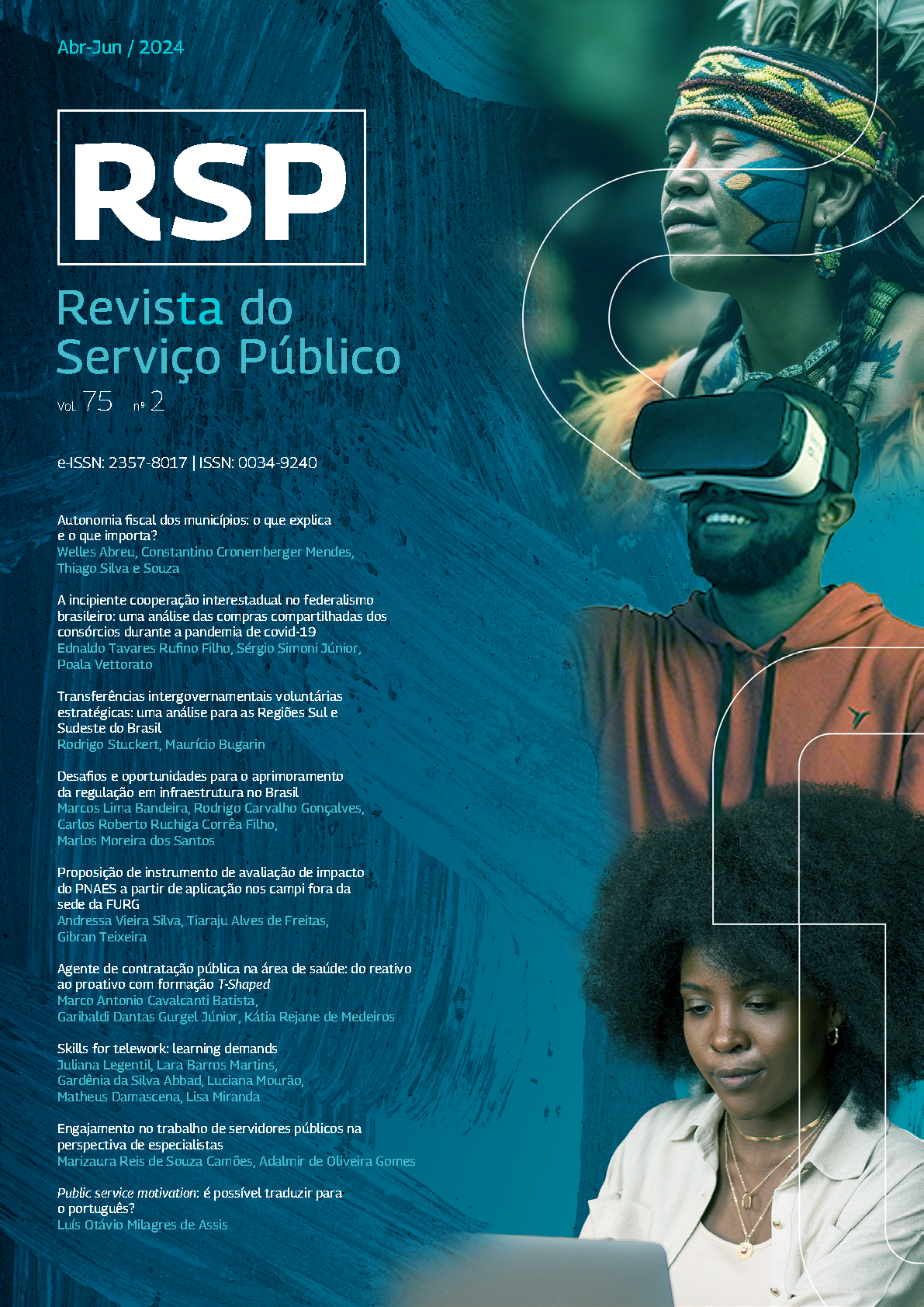Work engagement of public servants from the specialists perspective
DOI:
https://doi.org/10.21874/rsp.v75i2.9884Keywords:
work engagement, perception, public servants, federal public administrationAbstract
Work engagement is defined as a positive and fulfilling mental state towards work. Understanding the factors that impact public sector employees' engagement is crucial in creating effective personnel management policies. The aim of the article was to determine the perception of experts regarding the drivers of engagement and potential interventions in the work of Brazilian public sector employees. Data was gathered through focus groups made up of management and academic researchers specializing in the topic. A literature review on the drivers of engagement in the public sector from a multilevel perspective was conducted to develop the interview guide. The results show that interventions at the organizational level, including strategic management with clear organizational goals and outcomes and mechanisms for continuity during administrative transitions, appear to be the most promising.
Downloads
References
AIRILA, A.; JARI, J. HAKANEN; WILMAR, B.; SCHAUFELI; LUUKKONEN, R.; PUNAKALLIO, A.; LUSA, S. Are job and personal resources associated with work ability 10 years later? The mediating role of work engagement. Work & Stress, v. 28, n. 1, p. 87-105, 2014. https://doi.org/10.1080/02678373.2013.872208
ANCARANI, A.; DI MAURO, C.; GIAMMANCO, M. D.; GIAMMANCO, G. Work engagement in public hospitals: a social exchange approach. International Review of Public Administration, v. 23, n. 1, p. 1-19, 2018. https://doi:10.1080/12294659.2017.1412046
BAILEY, C.; MADDEN, A.; ALFES, K.; FLETCHER, L. The meaning, antecedents and outcomes of employee engagement: a narrative synthesis. International Journal of Management Reviews, v. 19, n. 1), p. 31-53, 2017. https://doi.org/10.1111/ijmr.12077
BAKKER, A. B.; BAL, M. P. Weekly work engagement and performance: a study among starting teachers. Journal of Occupational and Organizational Psychology, v. 83, n. 1, p. 189-206. doi:10.1348/096317909X402596
BAKKER, A.B.; DEMEROUTI, E. Towards a model of work engagement. Career Development International, v. 13, n. 3, p. 209-223, 2008. https://doi.org/10.1108/13620430810870476
BANDURA, A. Self-efficacy: the exercise of control. New York, NY: Freeman, 1997.
BARBIER, M.; DARDENNE, B. & HANSEZ, I. A longitudinal test of the Job Demands – resources model using perceived stigma and social identity. European Journal of Work and Organizational Psychology, v. 22, n. 5, p. 532-546, 2013. https://doi.org/10.1080/1359432X.2012.698056
BIGGS, A.; BROUGH, P.; BARBOUR, J. P. Strategic alignment with organizational priorities and work engagement: a multi-wave analysis. Journal of Organizational Behavior, v. 35, n. 3), p. 301-317, 2014. https://doi.org/10.1002/job.1866
BORST, R. T.; KRUYEN, P. M.; LAKO, C. J.; DE VRIES, M. S. The attitudinal, behavioral, and performance outcomes of work engagement: a comparative meta-analysis across the public, semipublic, and private sector. Review of Public Personnel Administration, v. 40, n. 4, p. 613-640, 2019. https://doi.org/10.1177/0734371X19840399
BORST, R.T. Comparing work engagement in people-changing and people-processing service providers: a mediation model with red tape, autonomy, dimensions of PSM, and performance. Public Personnel Management, v.47, n.3, p.287-313, 2018. https://doi.org/10.1177/0091026018770225
BOZEMAN, B. Bureaucracy and red tape. Upper Saddle River, NJ: Prentice Hall, 2000.
BREEVAART, K.; BAKKER, A. B.; DEMEROUTI, E. Daily self-management and employee work engagement. Journal of Vocational Behavior, v.84, n.1, p.31-38, 2014. https://doi.org/10.1016/j.jvb.2013.11.002
BRUNETTO, Y.; FARR-WHARTON, B.; FARR-WHARTON, R.; SHACKLOCK, K.; AZZOPARDI, J.; SACCON, C.; SHRIBERG, A. Comparing the impact of management support on police officers’ perceptions of discretionary power and engagement: Australia, USA and Malta. The International Journal of Human Resource Management, v. 31, n. 6, p. 738-759, 2017. https://doi.org/10.1080/09585192.2017.1375964
BRUNETTO, Y.; XERRI, M.; TRINCHERO, E.; FARR-WHARTON, R.; SHACKLOCK, K.; BORGONOVI, E. Public–private sector comparisons of nurses’ work harassment using set: Italy and Australia. Public Management Review, v.18, n.10, p.1479-1503. https://doi.org/10.1080/14719037.2015.1114136
BUCH, R. Leader–member exchange as a moderator of the relationship between employee–organization exchange and affective commitment. International Journal of Human Resource Management, v. 26, n. 1, p. 59-79, 2015. https://doi.org/10.1080/09585192.2014.934897
CAMÕES, M. R. S.; GOMES, A. O. Engajamento no trabalho: conceitos, teorias e agenda de pesquisa para o setor público. Administração Pública E Gestão Social, v.13, n.3, 2021. https://doi.org/10.21118/apgs.v13i3.10572
CHRISTIAN, M. S.; GARZA, A. S.; SLAUGHTER, J. E. Work engagement: a quantitative review and test of its relations with task and contextual performance. Personnel Psychology, v. 64, n. 1, p. 89-136, 2011. https://doi.org/10.1111/j.1744-6570.2010.01203.x
CONWAY, E.; FU, N.; MONKS, K.; ALFES, K.; BAILEY, C. Demands or resources? The relationship between HR practices, employee engagement, and emotional exhaustion within a hybrid model of employment relations. Human Resource Management, v. 55, n. 5, p. 901-917, 2016. doi:10.1002/hrm.21691
COOKE, D. K.; BRANT, K. K.; WOODS, J. M. The role of public service motivation in employee work engagement: a test of the Job Demands-Resources Model. International Journal of Public Administration, v. 42, n. 9, p. 765-775, 2019.
COOPER, D. R.; SCHINDLER, P. S. Métodos de pesquisa em administração. 7th ed. São Paulo: Bookman, 2003.
CORRÊA, I.; CAMÕES, M.; MEYER-SAHLING, J.; MIKKELSEN, K.; SCHUSTER, C. Distorções de incentivo ao desempenho e redução de motivação no serviço público federal no Brasil. Revista Do Serviço Público, v.71, n.3, p.476-503, 2020. https://doi.org/10.21874/rsp.v71i3.3408
CRAWFORD, E. R.; LEPINE, J. A.; RICH, B. L. Linking job demands and resources to employee engagement and burnout: a theoretical extension and meta-analytic test. Journal of Applied Psychology, v. 95, p. 834-848, 2010. https://doi.org/10.1037/a0019364
DE SIMONE, S.; CICOTTO, G.; PINNA, R.; GIUSTINIANO, L. Engaging public servants: public service motivation, work engagement and work-related stress. Management Decision, v. 54, n. 7, p. 1569-1594, 2016. doi:10.1108/MD-02-2016-0072
DEHART-DAVIS, L.; PANDEY, S. K. Red tape and public employees: does perceived rule dysfunction alienate managers? Journal of Public Administration Research and Theory, v. 15, p. 133-148, 2005.
EISENBERGER, R.; CUMMINGS, J.; ARMELI, S.; LYNCH, P. Perceived organizational support, discretionary treatment, and job satisfaction. Journal of Applied Psychology, v. 82, p. 812-820, 1997.
FLETCHER, L.; BAILEY, C.; ALFES, K.; MADDEN, A. Mind the context gap: a critical review of engagement within the public sector and an agenda for future research. The International Journal of Human Resource Management, V. 31, n. 1, p. 6-46, 2019. https://doi.org/10.1080/09585192.2019.1674358
FOLKMAN, S.; LAZARUS, R. S. An analysis of coping in a middle-aged community sample. Journal of Health and Social Behavior, v. 21, n. 3, p. 219-239, 1980.
GARGANTINI, T.; DALY, M.; SHERLOCK, J.; LAZEBNIK, T. Providing safe space for honest mistakes in the public sector is the most important predictor for work engagement after strategic clarity. Sustainability, v. 14, n. 12, p. 7051, 2022. https://doi.org/10.3390/su14127051
HAYES, M.; BUCKINGHAM, M. Employee engagement. Full Research Report. ADP Research Institute, 2020. Disponível em https://www.adpri.org/research/the-definitive-series-employee-engagement/ em julho de 2022.
HOUGHTON, J. D.; NECK, C. P. The revised self-leadership questionnaire: testing a hierarchical factor structure for self-leadership. Journal of Managerial Psychology, v. 17, p. 672-691, 2002. http://dx.doi.org/10.1108/02683940210450484.
JANSEN, T.; BRINK, G. J. M.; VAN DEN KOLE, J. Professional pride: a powerful force. Amsterdam, The Netherlands: Boom, 2010.
JANSSEN, P. P. M.; SCHAUFELI, W. B.; HOUKES, I. Work-related and individual determinants of the three burnout dimensions. Work & Stress, v. 13, p. 74-86, 1999,
JIANG, K.; CHUANG, C. H.; CHIAO, Y. C. Developing collective customer knowledge and service climate: the interaction between service-oriented high-performance work systems and service leadership. Journal of Applied Psychology, v. 100, n. 4, p. 1089-1106, 2015. doi:10.1037/ apl0000005
KARASEK, R.; THEORELL, T. Healthy work: stress, productivity, and the reconstruction of working life. New York: Basic Books, 1990.
LIAO, H.; TOYA, K.; LEPAK, D. P.; HONG, Y. Do they see eye to eye? Management and employee perspectives of high-performance work systems and influence processes on service quality. Journal of Applied Psychology, v. 94, n. 2, p. 371-391, 2009. doi:10.1037/a0013504.
LOON, N. M.V.; HEEREMA, M.; WEGGEMANS, M.; NOORDEGRAAF, M. Speaking up and activism among frontline employees: how professional coping influences work engagement and intent to leave among teachers. The American Review of Public Administration, v. 48, n. 4, p. 318-328, 2018. doi:10.1177/0275074016682313
LOPEZ, F. G.; BUGARIN, M. E.; BUGARIN, K. Mudanças político-partidárias e rotatividade dos cargos de confiança (1999-2013). In: LOPEZ, F. G. Cargos de confiança no presidencialismo de coalizão brasileiro. Brasília: Ipea, 2015.
LUU, T. T. Service-oriented high-performance work systems and service-oriented behaviours in public organizations: the mediating role of work engagement. Public Management Review, v. 21, n. 6, p. 789-816, 2019. doi:10.1080/14719037.2018.1526314
May, D. R.; Gilson, R. L.; Harter, L. M. The psychological conditions of meaningfulness, safety and availability and the engagement of the human spirit at work. Journal of Occupational and Organizational Psychology, v. 77, p. 11-37, 2004.
MOSTAFA, A. M. S.; ABED EL-MOTALIB, E. A. Ethical leadership, work meaningfulness, and work engagement in the public sector. Review of Public Personnel Administration. Online first publication, 2018. doi:10.1177/0734371X18790628
PERRY, J. L.; HONDEGHEM, A. Building theory and empirical evidence about public service motivation, International Public Management Journal, v. 11, n. 1, p. 3-12, 2008. doi: 10.1080/10967490801887673
RODWELL, J.; NOBLET, A. J.; ALLISEY, A. Improving employee outcomes in the public sector. Personnel Review, v. 40, p. 383-397, 2011.
RUNHAAR, P.; KONERMANN, J.; SANDERS, K. Teachers’organizational citizenship behaviour: considering the roles of their work engagement, autonomy and leader-member exchange. Teaching and Teacher Education, v. 30, p. 98-108, 2013.
Salmela-Aro, K.; Nurmi, J.-E. Self-esteem during university studies predicts career characteristics 10 years later. Journal of Vocational Behavior, v. 70, p. 463-477, 2007.
SAMPAIO, R. C.; LYCARIÃO, D. Análise de conteúdo categorial: manual de aplicação. (Coleção Metodologias de Pesquisa). Brasília: Enap, 2021.–
SCHAUFELI, W.; SALANOVA, M.; GONZALEZ-ROMA, V.; BAKKER, A. B. The measurement of engagement and burnout: a two sample confirmatory factor analytic approach. Journal of Happiness Studies, v. 3, p. 71-92, 2002. https://doi.org/10.1023/A:1015630930326
SORA, B.; CABALLER, A.; PEIRO, J. M. Consecuencias de la inseguridad laboral. El papel modulador del apoyo organizacional desde una perspectiva multinível. Psicothema, v. 23, p. 394-400, 2011.
SUN, L. Y.; S. ARYEE, S.; LAW, K. S. High-performance human resource practices, citizenship behavior, and organizational performance: a relational perspective. Academy of Management Journal, v. 50, n. 3, p. 558-577, 2007. doi:10.5465/amj.2007.25525821.
TUMMERS, L.G.; ROCCO, P. Serving clients when the server crashes: how frontline workers cope with e-government challenges. Public Administration Review, v. 75, n. 6, p. 817-827, 2015.
VAN DEN BROECK, A.; VANDER ELST, T.; BAILLIEN, E.; SERCU, M.; SCHOUTEDEN, M.; DE WITTE, H.; GODDERIS, L. Job demands, job resources, burnout, work engagement, and their relationships. Journal of Occupational and Environmental Medicine, v. 59, n. 4, p. 369-376, 2017. doi:10.1097/JOM.0000000000000964
VERA, M.; MARTINEZ, I. M.; LORENTE, L.; CHAMBEL, M. J. The role of co-worker and supervisor support in the relationship between job autonomy and work engagement among Portuguese nurses: a multilevel study. Social Indicators Research, v. 126, n. 3, p. 1143-1156, 2016. doi:10.1007/s11205-015-0931-8
VUJČIĆ, M. T.; OERLEMANS, W. G. M.; BAKKER, A. B. How challenging was your work today? The role of autonomous work motivation. European Journal of Work and Organizational Psychology, v. 26, n. 1, p. 81-93, 2017. DOI: 10.1080/1359432X.2016.1208653
Downloads
Published
How to Cite
Issue
Section
License
Copyright (c) 2024 Revista do Serviço Público

This work is licensed under a Creative Commons Attribution-NonCommercial-ShareAlike 4.0 International License.
- A RSP adota a licença Creative Commons (CC) do tipo Atribuição – Uso Não-Comercial (BY-NC).
- A licença permite que outros remixem, adaptem e criem obra licenciada, sendo proibido o uso com fins comerciais.
- As novas obras devem fazer referência ao autor nos créditos e não podem ser usadas com fins comerciais, porém não precisam ser licenciadas sob os mesmos termos dessa licença.
- Ao publicar o artigo na RSP, o autor cede e transfere para a ENAP os direitos autorais patrimoniais referentes ao artigo.
- O artigo publicado na RSP não poderá ser divulgado em outro meio sem a devida referência à publicação de origem.
- O autor que tiver o artigo publicado na RSP deverá assinar o Termo de Concessão de Direitos Autorais (em momento oportuno a editoria da Revista entrará em contato com o autor para assinatura do Termo).



